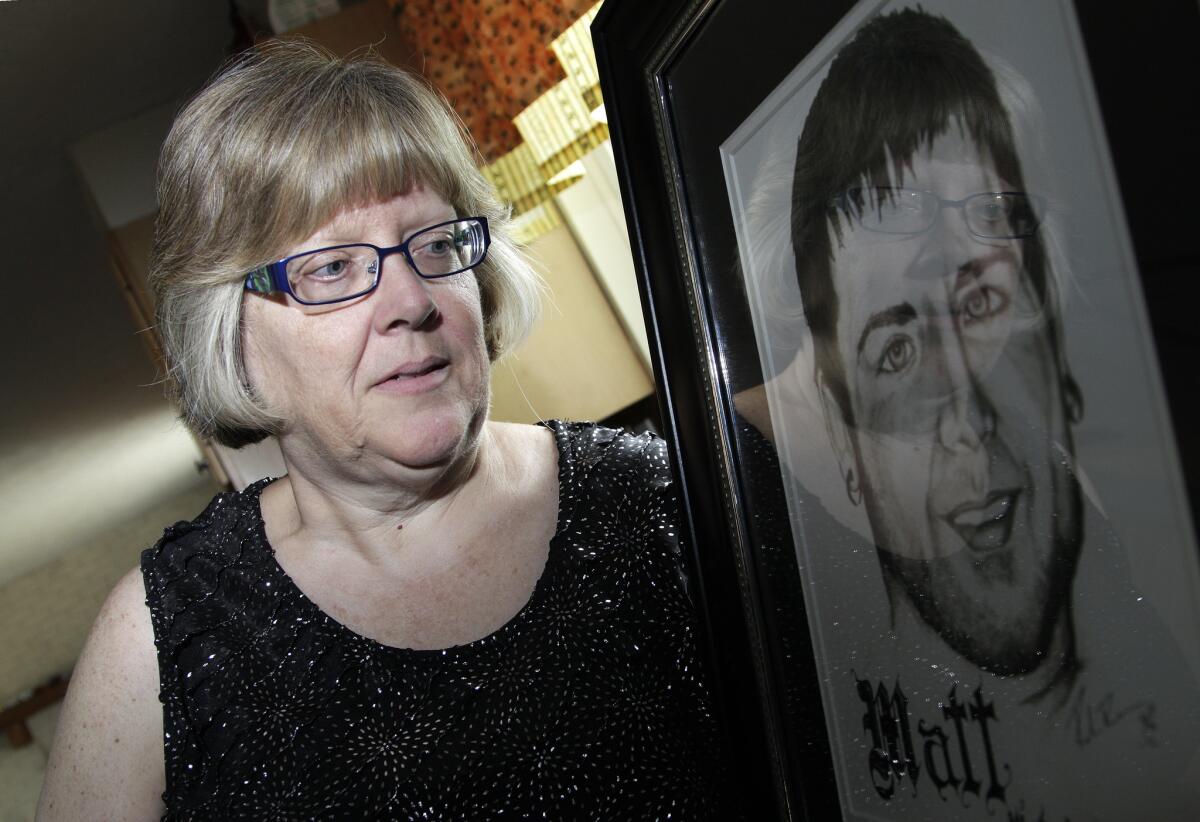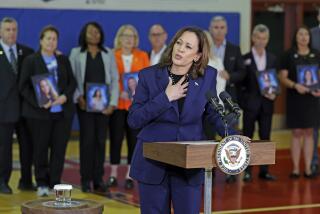Aurora shooting, one year later: Survivors speak of pain and healing

AURORA, Colo. — It is not a small club, the survivors of the shootings at Theater 9.
The Century 16 auditorium was packed — 421 men, women and children who had turned out for a midnight showing of “The Dark Knight Rises.” When a bizarre figure, helmeted and clad in black, appeared before them in a cloud of smoke, they reacted with bemusement and amazement, shock and confusion and — finally — horror.
Twelve people died, 70 were injured, and more than 300 fled into the night and into the arms of loved ones.
Column One: Aurora victims to wed on anniversary
A year later, the survivors cannot forget their terror, or the injuries they suffered, or their losses. But they search for meaning, and sometimes find it: the victims whose faith has strengthened; the father who lost his son but found a cause; the mother whose son was killed and how she is still coming to grips with it.
———
Pierce O’Farrill was sitting a few rows up on the right side of the theater when he saw a tear gas canister fly in front of the movie screen, followed by the silhouette of the gunman and a green laser shining from the scope of one of his weapons.
“My heart just kind of stopped,” O’Farrill said. “I can still in my head hear the [gunman’s] footsteps. Everything went quiet for me.”
A blast from a shotgun hit him in the chest and the left foot as he tried to take cover. Moments later, the gunman came closer and shot him with a .40-caliber pistol, shattering his left arm. The shot barely missed a nerve that controls hand function, doctors told him.
O’Farrill, 29, still has shotgun pellets in his chest and a bullet lodged in his arm. It aches when he exercises or when a storm is approaching.
Still, he said, as a devout Christian — a worker for the Denver Rescue Mission — he forgives the man charged in the shootings.
O’Farrill said he saw James Holmes for the first time in the hospital, on television news.
“When I saw him, I saw a lost soul,” he said. “I saw a guy who was lost and the darkness got him.
“Everybody deserves a chance to be forgiven.”
O’Farrill said he hopes Holmes, if convicted, spends the rest of his life in prison — but that he would even like to meet him one day to see if he is remorseful.
“I would want him to know that there are people in this world that do not hate him,” he said. “I want to tell him there is hope in this world, even in the darkest place where he is going to live the rest of his life.”
That hope — and a lot of counseling — drive O’Farrill forward and make him stronger.
He has begun to play basketball and lift weights again, and now he has bigger goals on his horizon. O’Farrill got engaged July 2 and plans to get married sometime next year. Children, he hopes, will follow.
He feels incredibly lucky to be alive. “The last year’s been a blessing,” he said.
— By Thomas Peipert
———
When word of the shootings spread, Tom Sullivan rushed to the staging area at the high school parking lot. His son Alex had gone to see the new Batman movie to celebrate his 27th birthday, two days before his first wedding anniversary.
When he learned that Alex was gone, Tom cried out and embraced his wife and daughter — a moment captured in a photo that ran on dozens of newspaper front pages and websites.
Weeping in the parking lot, Sullivan realized he had no regrets about his relationship with his son. Each knew how much he was loved by the other. They went on guys-only Super Bowl trips to Las Vegas, celebrating craps wins with Jameson whiskey and cigars. When Alex turned 18 and wanted to get a tattoo, Tom got one too, even though he admitted the experience left him a little pale and sweaty.
“There were no unspoken words,” Sullivan said.
He laughs easily when remembering his son. He’s drawn comfort over the past year from talking about Alex, and the lesson he has learned: We must appreciate what we have.
He also has testified in favor of gun control laws at the state Capitol and went to the reopening of the Aurora movie theater, an event many other victims’ families boycotted, including Alex’s widow. His son loved going to the movies and the theater is part of the community — a place where people come together, where kids can ride to on their bikes.
Sullivan has been back to the theater about half a dozen times, sometimes watching movies in the revamped auditorium where his son was killed. He sits in the seat and row where he believes Alex was sitting and leaves an empty seat for him.
It isn’t always easy. Each Friday and the 20th of each month have been a reminder of loss. His wife, Terry, a school bus driver, didn’t want summer vacation to come even as the children around her grew more excited.
“Some days we’re not moving forward; some days we’re just making it through,” he said.
July 20 has been a day Tom Sullivan has celebrated his whole life — his mother’s birthday, and then Alex’s. This year, he’ll probably participate in some of the public events marking the event, though he said he won’t be going for his own sake. He wants to show people that he’s OK — and that they, too, can try to go back to normal life.
And he’ll probably have some Jameson and cigars, to remember Alex.
— By Colleen Slevin
———
Marcus Weaver said he thinks God had a plan for him that night.
He was sitting in the fifth row next to his friend Rebecca Wingo when the shooting began — “so loud, and you could see the white spray of the gun, and that’s the image that is the one that is hard to get out of my head,” he said.
Weaver was hit in the right shoulder by shotgun pellets. Wingo, a 32-year-old former Air Force linguist, was killed.
Weaver, 42, of Denver described trying to grab his friend, and plunging through a horrific scene of bodies blocking the rows and aisles of the theater.
“In the 30 days after the shootings, every morning I got up and I prayed about it. And the Lord kept bringing people my way that would help,” he said.
It was that faith, Weaver said, that helped him cope with the loss of Rebecca and to decide to forgive James Holmes, the man charged in the shootings.
“There’s a lot of pain, a lot of hurt for him to execute something like that,” he said. “And my whole thing was, if I carry that same hate and that same pain around for the rest of my life because of what he’s done, then I’m going to be just like him. And my faith was telling me to just let it go.”
Weaver also said that a few days after the shooting he read a passage in the Bible that explains how to be a light in the darkness.
“I thought, man, the darkness of the theater. How can I be a point of light?” he asked.
So Weaver began to speak to youth groups, students and prisoners about his story.
“It seemed the more I told it, the more it would help people,” he said. “So I realized that God started using me as a point of light. …
“Is God using me for a higher purpose? Absolutely.”
— By Thomas Peipert
———
Jerri Jackson tried to return to her job as a trucking company claims adjuster a few weeks after her son, Matthew McQuinn, was killed. But the pain was too much to bear. She has yet to return to work. Getting out of bed and out of the house to buy groceries is hard some days.
“I just don’t want to be around people,” Jackson said in a phone interview from her home in Springfield, Ohio.
McQuinn, 27, was sitting with his girlfriend, Samantha Yowler, in the first row of the second level of the theater’s stadium seating when the firing began.
As Jackson tells it, McQuinn said, “Ow, that hurts,” before he jumped on Yowler to shield her from gunfire.
Yowler survived. McQuinn didn’t.
Jackson remembers a conversation she had with her son, hours before the shooting. He talked about plans to move back to Ohio to work at a car parts factory near St. Paris; perhaps he would marry Yowler. He was homesick after struggling for a year to find full-time work in Colorado. Jackson offered to let him live with her to get started.
Then McQuinn said he had to go. He was going to the movies.
“I told him, ‘Be careful,’” Jackson said. “He said, ‘I know. … I’ll talk to you later, Mom. I love you.’ And that was it.”
Now, she keeps close at hand the blanket in which she wrapped Matthew when he was a baby — she found it in his apartment, among his things.
After he died, she bought a Mitsubishi Eclipse because her son had wanted one. “I tell people that the car belongs to my son, but I get to drive it,” Jackson said.
Painted on the rear of the car is the legend, “Real Heroes Don’t Wear Capes.” And: “Matt McQuinn RIP.”
And the letter “M” — Superman-style.
ALSO:
Detroit bankruptcy: ‘Enough is enough,’ governor says of decline
Arizona wildfire: Report says most buildings lacked brush clearance
Rolling Stone cover leads to release of new photos of Tsarnaev arrest
More to Read
Sign up for Essential California
The most important California stories and recommendations in your inbox every morning.
You may occasionally receive promotional content from the Los Angeles Times.










